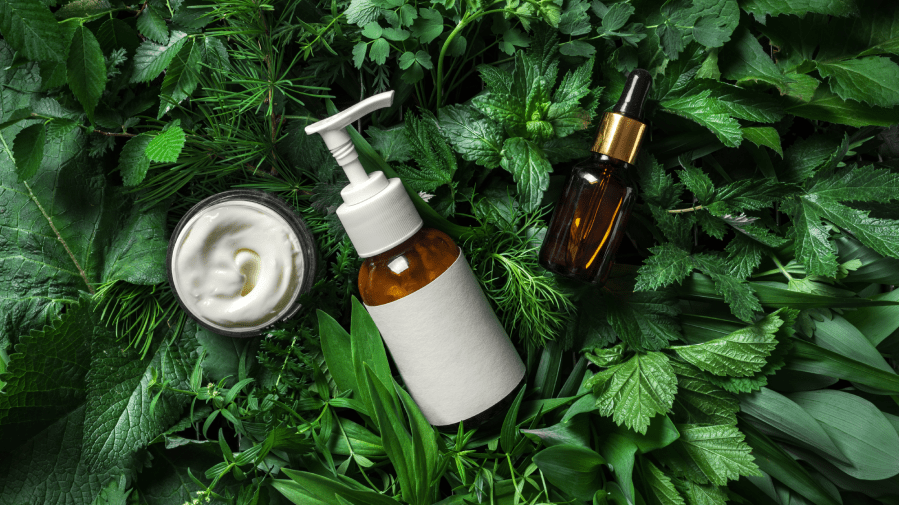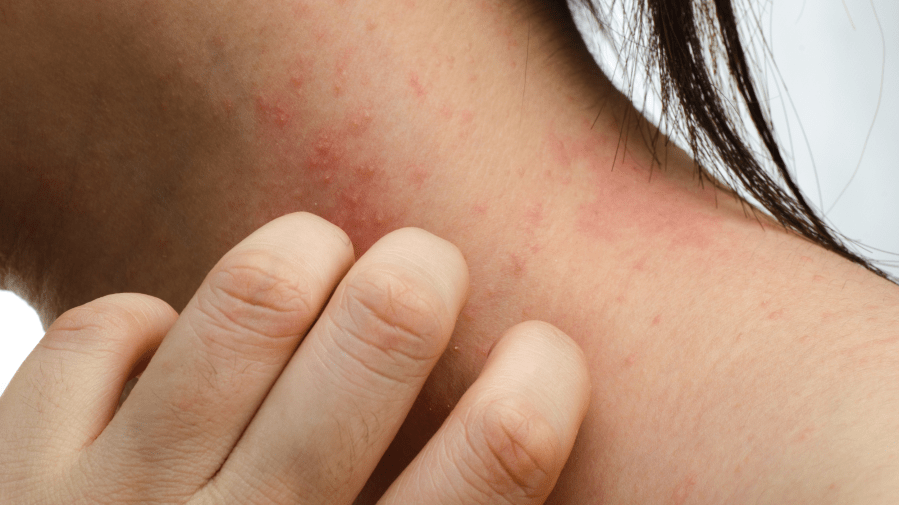
If you’ve had eczema for a while now, you know how hard it is to get rid of the pesky patches of dry, itchy skin it causes. To make things worse, some of the treatments prescribed for your skin condition actually irritate and dry it out even more. Natural remedies can help soothe your sore, parched skin. Keep reading to find out which natural eczema treatment types offer relief.
What Is Eczema?
Eczema is one of the many types of dermatitis — an umbrella term for skin conditions that cause swelling and redness of the skin. It’s often mistaken for another skin condition called psoriasis.
It affects around 1 in 10 people in the United States. Roughly 60% develop the skin condition before their first birthday with most getting it before the age of 5.
Atopic dermatitis (also called atopic eczema) is the most common type of eczema. Hence, the terms are often used interchangeably.
“Atopic” points to eczema’s allergy aspect. Around 75% of people with severe atopic dermatitis also get allergic rhinitis (hay fever). Roughly half develop asthma. This triad is known as the “atopic march.”
What Are the Symptoms of Eczema?

An overactive immune system causes patches of dry, inflamed and intensely itchy skin. These skin lesions may look red in people with lighter skin or appear ashen, brown, gray or purple in those with darker skin. Small bumps and skin flaking may also be observed.
Scratching can make the itching and accompanying symptoms worse. Doing so can also lead to skin infections, which can cause painful, pus-filled blisters to form. And repeated rubbing and scratching can cause your skin to grow darker and thicker (called lichenification) or form scars.
Eczema may also cause:
- Darker skin around your eyes or an extra skin fold under them
- More creases on your palms
- Plugged hair follicles, which cause small bumps to form in areas such as your face, upper arms and thighs
What Causes Eczema to Flare Up?
Eczema symptoms can break out now and again. These are called eczema flare-ups.
Common triggers include:
- Very dry or sweaty skin
- Skin irritants such as those from harsh chemicals and cleaning products, as well as from natural substances such as juices from meats and fresh produce
- Temperatures that are too dry, hot or humid, cold and damp or fluctuate quickly
- Pollutants such as tobacco smoke
- Wool or synthetic fibers
Can Stress Cause Eczema?
Emotional and psychological stress can also prompt eczema flare-ups. How and why this happens isn’t fully known but it may have something to do with the effects of stress on your immune system.
Over time, chronic stress can lead to inflammation in your body. This weakens your body’s ability to fight off illness and disease.
Does Eczema Go Away Without Treatment?
Eczema breakouts may sometimes get better without treatment, especially if they’re mild. In some cases, eczema isn’t a lifelong skin issue. This may be the case for some adults first diagnosed as children. But for most, this isn’t the case.
Which Natural Eczema Treatments Work Best?
We have yet to find a cure for eczema. But self-care measures and various eczema treatments can help.
Natural treatments such as those used in various complementary and alternative medicine approaches, including herbal medicine and Ayurveda, help ease symptoms and lessen the chance of flare-ups. Check with your doctor before trying these to be sure they’re safe for you and don’t interact with medicines you take.
Natural Eczema Treatment: Bath and Moisture
One of the best ways to combat parched skin is to soak in soothing baths and apply gentle moisturizers such as creams and ointments. Try adding these to your bathwater:
- Gentle, fragrance-free bath oil
- ¼ cup baking soda (or form a paste and place it on your skin)
- Colloidal oatmeal made from finely ground oats (or form a paste for your skin)
- 1 cup of salt (use cautiously if you’re having severe flare-ups as this can sting)
- 1 to 2 cups of apple cider vinegar (ACV has an antibacterial effect)
Natural Eczema Treatment: Wet Wraps
Wet wrapping helps control eczema flare-ups and calm symptoms such as moderate to severe itching or pain. The therapy hydrates your skin and allows medicines and moisturizers to absorb better.
It involves soaking a layer of fabric dressing [such as gauze] in water [or ACV] and placing them on your affected skin. The wet dressing is covered with a layer of dry dressing, followed by careful placement of your sleepwear.
This is usually done after you bathe, moisturize and apply medicine. It can be left on for a few hours or overnight but be sure the wet dressing doesn’t dry out.
It’s best to talk with your doctor before trying wet wrap therapy. Doing it the wrong way can injure your skin.
Natural Eczema Treatment: Vitamins
A review of studies published in Evidence-Based Complementary and Alternative Medicine found that certain vitamins help improve symptoms, especially in people with moderate to severe eczema.
These include vitamins D3, E and C. Topical creams with B12 (0.07% cyanocobalamin in a moisturizing base or barrier cream) also confer benefits.
Natural Eczema Treatment: Acupuncture
Acupuncture is an ancient healing practice based on Traditional Chinese Medicine. It involves inserting very small, thin needles into acupoints (strategic pressure points on your body).
A review of studies published in Acupuncture in Medicine found the ancient approach helps make itching less intense. And compared to conventional medicine, the study found acupuncture to be more effective at curbing common eczema symptoms and their severity.
Natural Eczema Treatment: Plant-Based Topical Remedies
Certain plant-based remedies applied to the skin can help alleviate eczema symptoms and make them less severe. For instance, sunflower oil helps retain skin moisture and alleviate itching and swelling.
Virgin, cold-pressed coconut oil [made with the drupe fruit’s meat] helps reduce the level of harmful bacteria on the skin and keep it moist.
Studies have shown honey can help make your eczema symptoms less severe. It also helps reduce redness, swelling and abrasions left from scratching.
Studies have also shown curcumin (turmeric) can significantly decrease symptoms. Microemulsions made with liquids, oils and turmeric help with redness and swelling. Gels and ointments help with itching and skin thickening.
Which Stress Management Techniques Help With Eczema?
Stress and the negative emotions that come with it can make your eczema flare up. On the other hand, research has shown that stress-management techniques and positive emotions can improve eczema symptoms and lessen the chance of flare-ups.
Ways to keep your stress in check include therapies such as cognitive behavioral therapy and hypnosis, as well as:
Massage to Ease Tension
Massage helps loosen tight muscles and quiet stressful thoughts. Be sure your massage therapist knows how to work with this skin condition. Also, be sure their massage oils and lotions are safe to use on eczema.
Meditation to Calm Your Mind
Meditation calms your mind by steering your thoughts away from stressors and toward what’s happening to your body in the present moment. This includes body movements such as the rise and fall of your chest and abdomen as you breathe in and out slowly.
Qigong, Tai Chi and Yoga to Promote Balance
These ancient practices involve slow, deliberate movement, breathing and meditation to attain focus and clarity. They’ve been shown to reduce tension and lower inflammation.
Which Lifestyle Changes Help Control Eczema?
Certain lifestyle factors can impact atopic dermatitis flare-ups and symptoms for the better.
Laughter as Medicine for Eczema
Research has shown that positive emotions can strengthen your body’s immune response. One way to do this is to laugh more.
In fact, the authors of a review published in Experimental and Therapeutic Medicine note that laughing can decrease your skin’s allergic response while boosting the actions of your [immune system’s] natural killer (NK) cells.
Kissing, the Feel-Good Natural Eczema Treatment
The same review found that kissing coupled with the human connection it forms plays a role in allergen-induced skin conditions. It can ease eczema severity and reduce the role that certain factors within your body play in its development.
These include factors such as:
- Nerve growth factor
- Brain-derived neurotrophic factor
- Neurotrophin-3 and NT-4
Music as Therapy for Eczema
We’re only starting to unravel how music allays symptoms of diseases such as eczema. Some studies have shown that listening to pleasing music boosts the activity of NK cells and other immune-protective cells such as T cells. They also influence the actions of small proteins involved in your immune response called cytokines (e.g., interferon-gamma and interleukin-6).
Food for Fewer Lesions
Clinical research has shown that about 20% to 80% of people with atopic dermatitis have food allergies. These can worsen eczema skin lesions.
Try staying away from foods that tend to cause allergies for a period of time. Slowly add them back in one at a time to pinpoint which ones are causing this reaction.
Common foods that cause allergies include:
- Cow’s milk
- Eggs
- Gluten
- Nuts
- Shellfish
- Soy
Other foods that might actually help include:
- Fatty fish such as salmon
- Fruits and vegetables such as apples, broccoli and spinach
- Sourdough bread
- Yogurt
To be sure you get the right balance of nutrients, it’s best to check with your doctor or a registered dietitian before overhauling your eating habits to align with an eczema-friendly diet.
Resource Links:
- “Assessment of the Effectiveness of Vitamin Supplement in Treating Eczema: A Systematic Review and Meta-Analysis” via Evidence-Based Complementary and Alternative Medicine
- “Available Eczema Treatments” via National Eczema Association
- “Complementary and Alternative Medicine Treatments for Common Skin Diseases: A Systematic Review and Meta-Analysis” via JAAD international
- “Complementary and Alternative Treatments” via National Eczema Association
- “Eczema” via StatPearls [Internet]
- “Eczema Causes and Triggers” via National Eczema Association
- “Eczema Types: Atopic Dermatitis Overview” via American Academy of Dermatology Association
- “The Effectiveness and Safety of Acupuncture for Patients With Atopic Eczema: A Systematic Review and Meta-Analysis” via Acupuncture in Medicine
- “The Impact of Lifestyle Factors on Evolution of Atopic Dermatitis: An Alternative Approach” via Experimental and Therapeutic Medicine
- “Wet Wrap Therapy” via National Eczema Association





